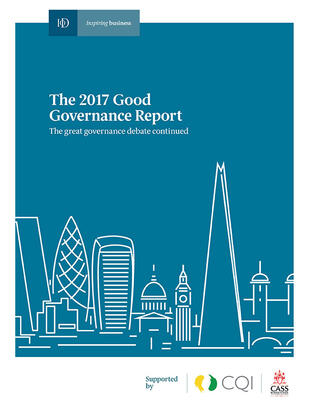
The rise of the stakeholder
Progress indicator
The Good Governance Report, produced by the IoD and sponsored by the CQI, puts stakeholders at the heart of how corporate governance is assessed.
Corporate governance has been high on the business agenda for some time. But now there’s a push for companies to look at governance more broadly and consider the impact of what organisations do with a wide array of stakeholders – not just shareholders.
This year’s Good Governance Report, published by the Institute of Directors (IoD) and sponsored by the Chartered Quality Institute (CQI), puts stakeholders centre stage, thanks to input from the CQI and its members.
The report, now in its third year, ranks the UK’s largest listed companies according to the Good Governance Index, taking into account factors such as how much the directors are paid, their relations with shareholders, the strength and independence of their audit committee and whether they have ISO 9000 certification.
Topping this year’s list are drinks giant Diageo, insurance company Aviva and engineering business GKN. The lowest scores went to pharma company GlaxoSmithKline, cruise line owner Carnival and security firm G4S. Overall, energy and utility companies scored relatively highly, while technology companies scored relatively low. The rankings were reported in The Times, The Financial Times, City AM and The Independent.
This year is the first time that hundreds of Chartered Quality Professionals contributed to the rankings by rating, in a survey, their perceptions of how well companies are governed. These stakeholder ratings were used to weigh the relative importance of the different factors on which companies were measured.
Roger Barker, head of corporate governance at the IoD, said: “What we wanted to do this year was to broaden the indicators that we were using towards a broader stakeholder approach, and that’s been reflected in the increase in the number of indicators we’ve used this year.”
In a discussion, on the growing importance of stakeholders in corporate governance, CQI board member Mike Turner said: “Good management sense, as I was always taught, is that a business trades on its relationships. Success is when you get an array of stakeholders where you can actually achieve mutual success for all of [them].”
The voice of shareholders is vital, Turner said. “If you don’t get that, you can get situations where the balance on shareholder return is so strong that it can drive behaviour right down into the very bottom of the organisation”, which is “a dangerous recipe for corporate catastrophe [and] can destroy shareholder value”.
Good management sense, as I was always taught, is that a business trades on its relationships
Turner pointed to the CQI’s Competency Framework as a robust and established way of putting stakeholder needs and expectations at the very heart of how companies are run.
Jennifer Sundberg, co-chief executive of Board Intelligence, which advises companies on how to deal with boards, said it’s a “fallacy” that company directors don’t care about non-shareholders, and that young people do. In fact, Board Intelligence’s research shows that they care at least as much as the young, “if not more”.
But, she said, “there’s a mismatch between what company directors say they would like to be talking about in a board meeting, and what they’re actually doing. Financial and operational performance, particularly short-term financial and operational performance, dominates the board’s attention.”
She adds: “Once upon a time corporate governance was about protecting investors from management. Increasingly, I think it’s about protecting the company from the investors.”
Especially for young, founder-led businesses, Sundberg said, the motivation of directors is often about “a purer sense of purpose” than simply maximising profit.
The government is paying attention too: in August it announced that it plans to introduce rules requiring big companies to report on how their boards have taken the interests of employees and other stakeholders into account.
Estelle Clark, the CQI’s executive director of policy, said corporate governance is “not only about investors having choice about who they invest in. It’s customers having choice about who they buy from. People having choice about who they work for. Organisations having choice about who they sell to. And all of us having choice about who we live alongside, who we wish to be in our society, and how we wish them to behave.”
The report’s key findings
- Energy companies performed better than the average, with the likes of Centrica, BP and BHP Billiton all making the top half of the list.
- IT companies performed relatively poorly. Professor Paolo Volpin of Cass Business School said fast-growing tech companies that don't adhere to “governance norms” may run into problems later.
- Audit and risk was the area of corporate governance that had the biggest influence on how companies were perceived by stakeholders.
- Some companies did well overall despite low scores in particular areas. For example, engineering firm GKN was ranked third, despite scoring relatively low on stakeholder relations, while travel company TUI came 14th despite a low score for board effectiveness.
- No correlation was found between the size of companies and how well governed they are. Estelle Clark, CQI executive director — policy, says this shows good governance is “not a matter of resource but of culture and will”.

